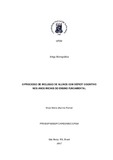| dc.contributor.advisor | Tonini, Andréa | |
| dc.creator | Ferrari, Nívia Maria Martins | |
| dc.date.accessioned | 2016-06-16T12:16:38Z | |
| dc.date.available | 2016-06-16T12:16:38Z | |
| dc.date.issued | 2007 | |
| dc.date.submitted | 2007 | |
| dc.identifier.uri | http://repositorio.ufsm.br/handle/1/1727 | |
| dc.description | Artigo (especialização) - Universidade Federal de Santa Maria, Centro de Educação, Curso de Especialização em Educação Especial - Déficit Cognitivo e Educação de Surdos, RS, 2007. | por |
| dc.description.abstract | The school has the leading role, develop the potential of their students, encouraging
the sense critical, social responsability, the exercise of citizenship and
thequalificationfor the job, linked to freedom andhuman solidarity. Currently to
achieve these goals,there are some necessary changes in the school and in
education. This researchhas the goal of field examine the reality school, seeking to
understand how the teachers are working and living inclusive education, which
guaranteesthe right to access and permanence of all students, including those with
special needs in regular classes of common schools. The questions aremany and
give them held to be a semistructured interview ( Annex roadmap) with two teachers
( X e Y ) of a school of the outskirts of São Borja/ RS. But the daily practice not
always consistent with the theory, or the knowledge acquired in school life, should
be associated with the design of a educatio sector, which provides the autonomy
and the desalienação, but the educators, are difficulties in the implementation of
teaching practices, do not have support of specialized professionals. The inclusion
of all school subjects wil be effective only when there is engagement and the
participation of the entire community into school ( parents, students, teachers,
management and employees). To better understand the dynamics ofthe society in
which the student lives, it may see itself as an active, with the ability to make a
model of society more just and solidarity. | eng |
| dc.language | por | por |
| dc.publisher | Universidade Federal de Santa Maria | por |
| dc.rights | Acesso Aberto | por |
| dc.subject | Educação inclusiva | por |
| dc.subject | Déficit cognitivo | por |
| dc.subject | Aprendizagem | por |
| dc.title | O processo de inclusão de alunos com déficit cognitivo nos anos iniciais do ensino fundamental | por |
| dc.type | Trabalho de Conclusão de Curso de Especialização | por |
| dc.degree.local | São Borja, RS, Brasil. | por |
| dc.degree.specialization | Educação Especial - Déficit Cognitivo e Educação de Surdos | por |
| dc.description.resumo | A escola tem como papel fundamental, desenvolver as potencialidades de seus educandos, incentivando o senso crítico, a responsabilidade social, o exercício da cidadania e a qualificação para o trabalho, vinculada à liberdade e a solidariedade humana. Atualmente para atingir estes objetivos, fazem-se necessárias algumas mudanças na escola e no sistema de ensino. Esta pesquisa de campo tem por objetivo analisar a realidade escolar, buscando compreender como os professores estão atuando e vivenciando a educação inclusiva, que garante o direito ao acesso e permanência de todos os alunos, inclusive aqueles com necessidades especiais nas classes comuns de escolas regulares. As indagações são inúmeras e para atendê-las realizou-se uma entrevista semi-estruturada (anexo roteiro) com duas professoras (X e Y) de uma escola da periferia de São Borja/RS. Porém a prática cotidiana nem sempre condiz com a teoria, ou seja, os conhecimentos adquiridos na vida escolar, devem ser associados à concepção de uma educação transformadora, que proporcione a autonomia e a desalienação, porém os educadores, encontram dificuldades na efetivação das práticas pedagógicas, por não possuírem apoio de profissionais especializados. A inclusão escolar de todos os indivíduos só será efetivada quando houver um engajamento e a participação de toda a comunidade escolar inserida (pais, alunos, professores, direção e funcionários). Ao compreender melhor a dinâmica da sociedade em que o aluno vive, este poderá perceber-se como elemento ativo, com capacidade de viabilizar um modelo de sociedade mais justa e solidária. | por |
| dc.publisher.unidade | Centro de Educação | por |


